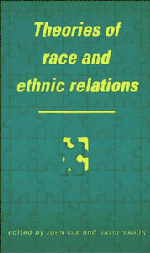Book contents
- Frontmatter
- Contents
- List of contributors
- Preface
- Introduction. Controversies and continuities in race and ethnic relations theory
- 1 Intersecting strands in the theorisation of race and ethnic relations
- 2 Epistemological assumptions in the study of racial differentiation
- 3 The role of class analysis in the study of race relations – a Weberian perspective
- 4 Varieties of Marxist conceptions of ‘race’, class and the state: a critical analysis
- 5 Class concepts, class struggle and racism
- 6 A political analysis of local struggles for racial equality
- 7 Ethnicity and Third World development: political and academic contexts
- 8 Social anthropological models of inter-ethnic relations
- 9 Pluralism, race and ethnicity in selected African countries
- 10 Ethnicity and the boundary process in context
- 11 Ethnicity and the sociobiology debate
- 12 Rational choice theory and the study of race and ethnic relations
- 13 The ‘Chicago School’ of American sociology, symbolic interactionism, and race relations theory
- 14 The operationalisation of identity theory in racial and ethnic relations
- Bibliography
- Index
7 - Ethnicity and Third World development: political and academic contexts
Published online by Cambridge University Press: 01 June 2011
- Frontmatter
- Contents
- List of contributors
- Preface
- Introduction. Controversies and continuities in race and ethnic relations theory
- 1 Intersecting strands in the theorisation of race and ethnic relations
- 2 Epistemological assumptions in the study of racial differentiation
- 3 The role of class analysis in the study of race relations – a Weberian perspective
- 4 Varieties of Marxist conceptions of ‘race’, class and the state: a critical analysis
- 5 Class concepts, class struggle and racism
- 6 A political analysis of local struggles for racial equality
- 7 Ethnicity and Third World development: political and academic contexts
- 8 Social anthropological models of inter-ethnic relations
- 9 Pluralism, race and ethnicity in selected African countries
- 10 Ethnicity and the boundary process in context
- 11 Ethnicity and the sociobiology debate
- 12 Rational choice theory and the study of race and ethnic relations
- 13 The ‘Chicago School’ of American sociology, symbolic interactionism, and race relations theory
- 14 The operationalisation of identity theory in racial and ethnic relations
- Bibliography
- Index
Summary
‘International’ and ‘Third World’ politico-academic contexts
Current analytic directions in the study of race and ethnicity provide useful grist for the contemporary mills of the sociology of knowledge. Not only do they demonstrate the historical evolution of different epistemological stances, as Michael Banton has shown in chapter 2; they also reflect the ongoing synthesis that we create between these academic traditions and the specific politico-academic contexts in which we operate. These contexts to a large extent determine our perspectives, focus our interest and through criteria of relevance set our priorities and provide funding for our scholarship. In discussing the analytic salience of these contexts this paper generalises to the extent of distinguishing between ‘international’ and ‘Third World’ arenas of scholarship, suggesting that in the Third World the contemporary analytic emphasis is on ethnicity rather than race, on national rather than international dimensions and on socio-political rather than socio-economic structures.
To illustrate the contrasts drawn in the generalisations made above, it is instructive to contrast two statements indicating agendas for race and ethnic relations research, one from a scholar representative of the international perspective and the other from a Third World research organisation. The first statement is by John Rex, who in his state-of-the-art paper of 1982 (Rex 1982a: 173–4) commented: ‘Racial discrimination, racial oppression, the propagation of racist ideas and genocide have all been topics of international concern and sociologists have been called upon to delineate their field and indicate the major causal factors responsible for these phenomena.’
- Type
- Chapter
- Information
- Theories of Race and Ethnic Relations , pp. 153 - 169Publisher: Cambridge University PressPrint publication year: 1986
- 4
- Cited by

